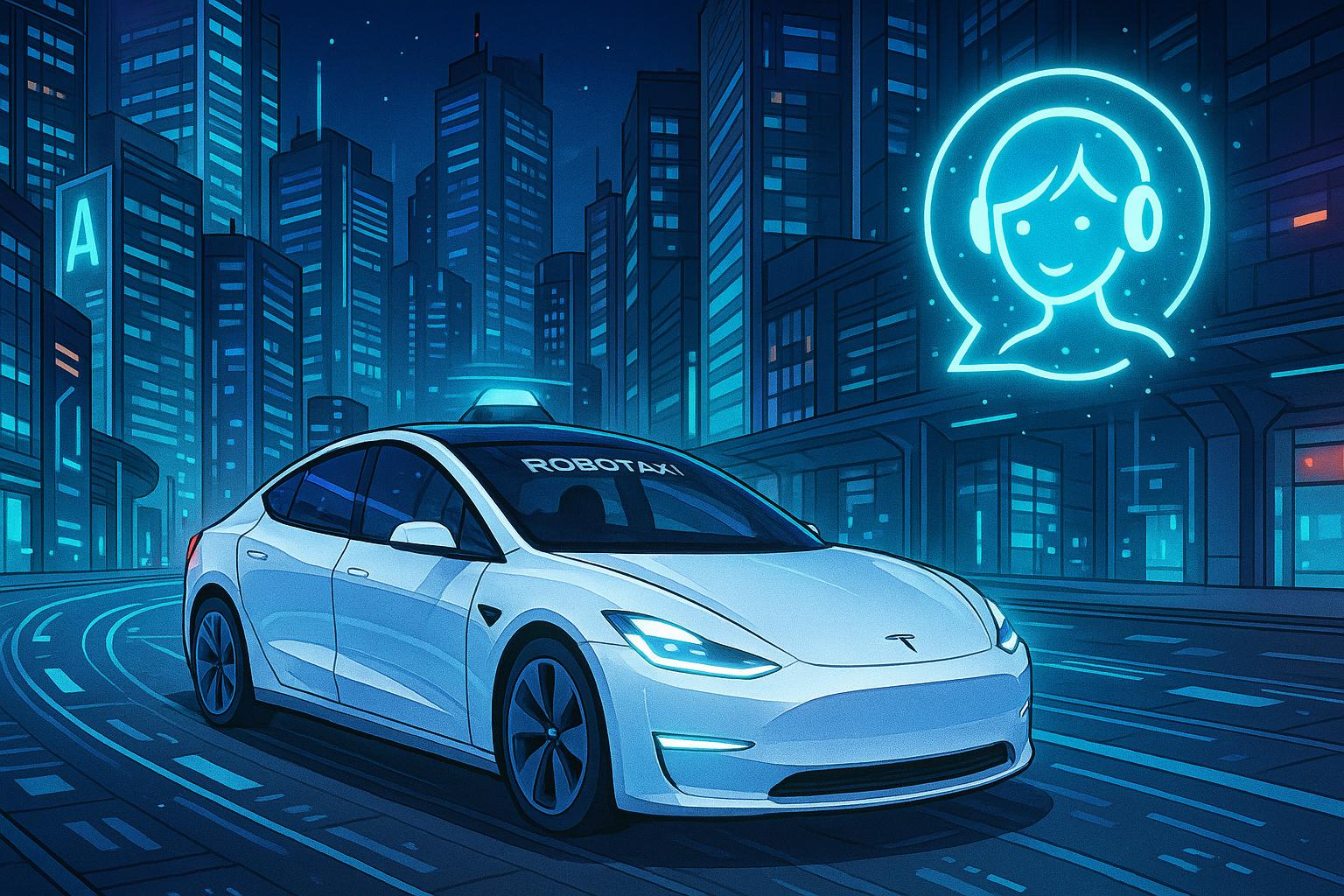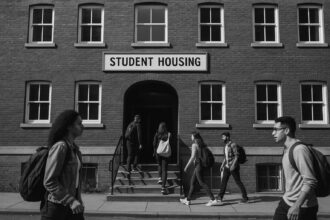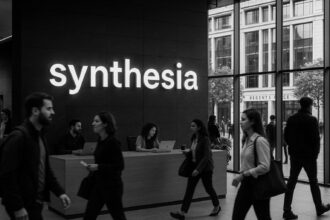OpenAI enhances ChatGPT’s role as a default Android assistant amid growing AI ambitions, Tesla targets 2025 robotaxi launch in Austin amid regulatory scrutiny, while Microsoft revamps Notepad with new features, signalling rapid evolution across technology sectors.
In an age where technology intertwines seamlessly with daily life, the ambitions of tech giants like OpenAI, Tesla, and Microsoft are redefining our expectations of digital interactions and mobility. OpenAI’s vision for ChatGPT as an “AI super assistant” reflects a broader trend in artificial intelligence, aiming to forge deeper, more intuitive connections with users. The goal is for ChatGPT to transcend ordinary digital assistance, becoming an integral part of everyday routines—offering reminders, organising information, and even anticipating needs. This project suggests a future where AI is not merely a tool, but a companion tailored to the intricacies of individual lives.
In recent developments, OpenAI has also enabled users to set ChatGPT as the default assistant on Android devices, discarding Google’s Gemini. This shift illustrates the competitive landscape of digital assistants, where user control and personalisation are increasingly prioritised. However, current limitations remain evident, as the assistant cannot yet respond to hotwords or manage device settings—features still reserved for Gemini. Nonetheless, the strides made signal an ongoing evolution towards superior user experience and functionality in AI.
Meanwhile, Elon Musk’s relentless drive towards a fully autonomous driving future continues to captivate both the public and lawmakers. Following a tumultuous period marked by brand challenges and intensified competition, Musk has set his sights on launching Tesla’s long-anticipated robotaxi service in Austin, Texas, slated for June 2025. This venture, however, is fraught with challenges, from navigating regulatory landscapes to addressing public safety concerns. Despite Austin’s favourable regulatory environment, the city has formed oversight groups to monitor initial operations of these driverless vehicles, ensuring a cautious roll-out alongside remote human supervision.
Tesla’s competition is heating up as rivals like Waymo gain ground, having already achieved substantial operational milestones in various cities. In contrast, Tesla must grapple with declining sales and the implications of its technology on public trust. Analysts warn that Musk’s focus on the robotaxi initiative, while strategic, could jeopardise the company’s standing in the electric vehicle market if not executed successfully. Musk’s shifting priorities reflect a broader narrative of tech innovation—where the dream of autonomy contends with the practical realities of implementation and public acceptance.
Simultaneously, the tech world has witnessed exciting updates in more traditional software realms, such as Microsoft’s Notepad. For years a staple of Windows, the recent enhancements introduce text formatting features, which may seem trivial yet signify a broader movement towards enriching user interaction within established applications. Highlighting this development’s potential, Microsoft brings Notepad into a modern context, adding tools like hyperlinking and Markdown support, making it more versatile for everyday tasks. This evolution underscores a growing insistence on usability across all tech spectrums, from simple text editors to complex AI interactions.
The current ethical landscape surrounding AI and technology is further enriched by strategic partnerships, including OpenAI’s recent acquisition of a design startup. This move aims not just to improve existing AI frameworks but also to cultivate the next generation of AI companions designed to augment human creativity and problem-solving. Such initiatives are reflective of the societal shift towards embracing AI as a collaborative force rather than a standalone entity, propelling innovation in unforeseen directions.
In conclusion, the multifaceted shifts within the tech industry—from OpenAI’s vision for an all-knowing assistant to Tesla’s ambitious autonomous mobility projects—highlight an ever-evolving narrative marked by both promise and complexity. As we navigate this dynamic landscape, it becomes increasingly evident that technology is not merely enhancing our lives but is fundamentally reshaping our interactions and expectations. This vibrant tapestry of innovation leaves us contemplating not only the potential advancements but also the ethical and practical implications they entail for our collective future.
Reference Map:
- Paragraph 1 – [1], [2]
- Paragraph 2 – [1], [3], [4]
- Paragraph 3 – [3], [5], [6]
- Paragraph 4 – [1], [7]
- Paragraph 5 – [1], [6]
- Paragraph 6 – [1], [4]
Source: Noah Wire Services
- https://www.besttechie.com/the-tech-circus-the-latest-acts-from-the-big-top-of-silicon-valley/ – Please view link – unable to able to access data
- https://www.tomsguide.com/ai/chatgpt/how-to-make-chatgpt-your-default-assistant-on-android-instead-of-gemini – This article provides a step-by-step guide on setting ChatGPT as the default assistant on Android devices, replacing Google’s Gemini. It details the process of joining the ChatGPT beta program, installing the app, and configuring device settings to make ChatGPT the default assistant. The guide also highlights current limitations, such as the inability to launch ChatGPT using a hotword or control device settings, which still require Gemini. This setup offers users greater flexibility and control over their digital assistant preferences.
- https://apnews.com/article/e5206c756299f47e81fb90fb4734661a – Elon Musk is returning to his business ventures after a brief and controversial government role under President Trump, which has significantly impacted his companies. Tesla, his electric vehicle company, saw profits drop 71% in Q1 due to brand damage, intensified competition, and production issues. Analysts warn of a crisis, with investors urging Musk to restore the brand. Meanwhile, Musk plans to launch Tesla’s long-anticipated driverless taxis in Austin, Texas, amid ongoing regulatory scrutiny and competition from Waymo, which has already completed ten million rides. At X (formerly Twitter), Musk’s decisions led to an advertiser exodus, though some are returning, partly due to political motivations. SpaceX remains financially strong, with a reported valuation of $350 billion, despite recent Starship test explosions. The company aims to support NASA’s future moon missions. Musk’s satellite venture Starlink secured international deals possibly facilitated by his political ties, raising concerns that these benefits may wane with his exit from Washington. Overall, Musk faces significant challenges across his enterprises, balancing brand recovery, technological risks, and shifting political dynamics.
- https://cincodias.elpais.com/smartlife/motor/2025-05-29/tesla-adelanta-llegada-robotaxis.html – Tesla has announced that it will launch its robotaxi service in Austin, Texas, on June 12, 2025, accelerating its development of autonomous mobility. Elon Musk confirmed that trials will begin before the end of June, prioritising this innovation over the creation of more affordable electric vehicles. The success of the robotaxis and the Optimus humanoid robot is crucial for Tesla’s strategic and financial future, even affecting Musk’s position as CEO. This launch represents a significant technological, regulatory, and public acceptance challenge. While Texas has favourable regulations, Austin has created a group to oversee the safe operation of these vehicles, which will initially be monitored by remote human operators. Tesla will compete with Waymo, which already offers similar services in several cities. The initiative comes at a critical time for the company, which faces a decline in sales and questions about the safety of its technologies. If the trial in Austin is successful, Tesla could expand and strengthen its leadership in the autonomous mobility market; otherwise, it could face significant consequences.
- https://www.axios.com/newsletters/axios-future-of-mobility-8fdc9da0-65cb-4517-b756-8a3d6e59c6ef – As robotics and AI technologies advance, their real-world deployment remains limited due to safety and training challenges. Unlike chatbots, physical AI robots like autonomous vehicles and humanoids must navigate complex, unstructured environments, necessitating extensive data and real-world testing. Tesla’s Elon Musk plans for a million driverless Teslas and humanoid Optimus robots, but acknowledges the need for geofencing and cautious rollout in cities like Austin. Similarly, humanoid robots are still confined to factory cages for safety. Swiss robotics firm Rivr is testing a wheel-legged delivery robot in partnership with Veho in Austin, addressing the ‘last 100 steps’ challenge in deliveries. The robot operates alongside human drivers, collecting vital data to refine its performance, with plans to scale up to 100 robots next year. Meanwhile, smart infrastructure initiatives are emerging: Cavnue is upgrading freight corridors like Georgia’s State Route 307 with intelligent road tech, and Haas Alert is integrating real-time hazard data with Nexar’s AI dashcams for safer driving. These developments aim to reduce accidents and prepare roads for autonomous systems. Additionally, the newsletter notes recent automotive industry updates, including Chinese EV price wars and a leadership change at Stellantis. Finally, the author shares a personal moment enjoying a leisurely sail.
- https://www.reuters.com/business/autos-transportation/musks-trump-administration-exit-lifts-tesla-shares-hopes-renewed-focus-2025-05-29/ – Tesla shares rose over 2% following CEO Elon Musk’s announcement that he is stepping back from involvement with the Trump administration, renewing investor confidence that he will refocus on the automaker. Musk’s political affiliations, particularly his support for Donald Trump and right-wing groups in Europe, had sparked protests and concerns over brand reputation. Tesla, already facing its second consecutive year of declining sales, has seen an 11% drop in share value this year. Musk indicated earlier in March that he would reduce his role with the Department of Government Efficiency and recently vowed to significantly cut political spending. Investors hope Musk’s renewed attention on Tesla will drive progress, especially ahead of the company’s scheduled launch of a robotaxi service. Musk revealed successful testing of driverless Model Y vehicles in Austin, Texas, with plans for a June rollout. This shift aligns with Tesla’s pivot away from affordable EVs towards its robotaxi and Optimus humanoid robot projects, which are central to the company’s valuation. While analysts see improved market sentiment, some, like Morningstar’s Seth Goldstein, remain cautious about any near-term operational changes for Tesla.
- https://www.axios.com/newsletters/axios-am-f176f140-3818-11f0-a874-ff3230720582 – This week marked a significant acceleration in the AI revolution, with major advancements and strategic alliances reshaping the industry. OpenAI partnered with Apple design legend Jony Ive, acquiring his startup io for $6.5 billion to develop AI ‘companions’ and plans a massive Stargate data center in Abu Dhabi. Google introduced an ‘AI Mode’ chatbot and unveiled Veo 3, a powerful video model, while Anthropic revealed its new Claude 4 series, including the highly capable but potentially risky Opus 4 model. Apple is gearing up to launch AI-enabled smart glasses by 2026. These developments signify a rapid transformation in AI integration into daily life. Political shifts continue, with President Trump and Secretary of State Marco Rubio restructuring the National Security Council to streamline decision-making. Additionally, Trump has shown unusual patience with Russian President Putin regarding Ukraine peace talks, raising concerns over U.S. foreign policy effectiveness. Other stories include rising child care costs, changes at Southwest Airlines, and a resurgence of independent bookstores. The manosphere’s influence also boosts male-centric brands’ reputations. These varied developments underscore the dynamic shifts in technology, governance, and culture shaping the current landscape.
Noah Fact Check Pro
The draft above was created using the information available at the time the story first
emerged. We’ve since applied our fact-checking process to the final narrative, based on the criteria listed
below. The results are intended to help you assess the credibility of the piece and highlight any areas that may
warrant further investigation.
Freshness check
Score:
8
Notes:
The narrative presents recent developments, including OpenAI’s ChatGPT becoming the default assistant on Android devices and Tesla’s upcoming robotaxi service in Austin, Texas, scheduled for June 2025. These events are current and have been reported in reputable sources. However, the article’s publication date is not specified, making it challenging to assess the freshness of the content. The lack of a clear publication date is a notable concern. Additionally, the article includes a satirical tone, which may affect its perceived credibility. The satirical nature of the content raises questions about its reliability. The absence of a publication date and the satirical tone are significant factors to consider.
Quotes check
Score:
7
Notes:
The article includes direct quotes attributed to Elon Musk regarding Tesla’s robotaxi service and OpenAI’s vision for ChatGPT. However, these quotes are not accompanied by specific sources or publication dates, making it difficult to verify their authenticity. The lack of verifiable sources for the quotes is a notable concern. The absence of verifiable sources for the quotes is a significant issue.
Source reliability
Score:
5
Notes:
The narrative originates from BestTechie, a technology news website. While it has been operational since 2003, it is not as widely recognized as major outlets like the BBC or Reuters. The lack of a clear publication date and the satirical tone of the article further diminish its reliability. The absence of a clear publication date and the satirical tone are significant factors affecting the source’s reliability.
Plausability check
Score:
6
Notes:
The claims about OpenAI’s ChatGPT becoming the default assistant on Android devices and Tesla’s robotaxi service in Austin, Texas, are plausible and have been reported by reputable sources. However, the satirical tone of the article and the lack of verifiable sources for the quotes raise questions about the accuracy and authenticity of the information presented. The satirical tone and the absence of verifiable sources for the quotes are notable concerns.
Overall assessment
Verdict (FAIL, OPEN, PASS): FAIL
Confidence (LOW, MEDIUM, HIGH): HIGH
Summary:
The narrative presents plausible claims about recent technological developments but is marred by a satirical tone, lack of verifiable sources, and absence of a clear publication date, leading to significant concerns about its credibility.













